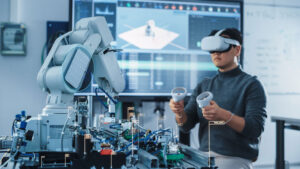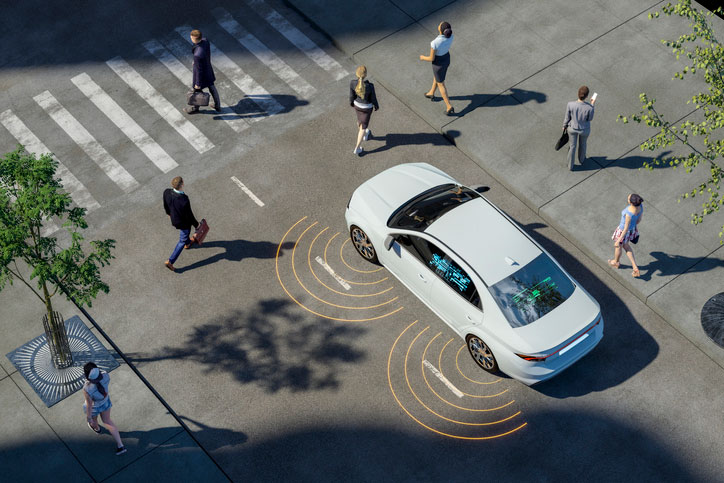Written by Scott Wilson

Suddenly, it seems like AI is happening everywhere. Your best friend’s kid is bragging about the book report they knocked-out in a fraction of the time with the help of ChatGPT. Your barista is putting up art he cranked out of Stable Diffusion. Your search results on the internet are getting way ahead of your questions, generating summaries of the available information on the topic you searched. There’s plenty of utility there, but for your average user it’s mostly just something novel and fun.
But what is now starting to get the attention it deserves are the many applications for AI that are far outside the domain of the average user. Today’s generative AI systems are marvels of computational intelligence, and in the hands of talented professionals skilled in their field, it can take natural talent and professional know-how to entirely new levels.
Those changes are coming fast. And they’ll be coming because a select group of experts who have mastered both their own field and the new concepts and tools of AI.
Of course, the AI research scientists and engineers are the ones with the vision and ability to turn AI into a practical, critical set of tools for key fields, whether medicine or biotechnology. But it’s the professionals and practitioners in those fields who will be using those tools to change the world and impact lives.
Some of the Most Exciting and Important AI Developments Are Happening in These Fields
 AI is going to be changing almost every profession through advanced specializations at some point. So what makes them different from the technologists who will be behind the scenes developing and working with AI in all those areas?
AI is going to be changing almost every profession through advanced specializations at some point. So what makes them different from the technologists who will be behind the scenes developing and working with AI in all those areas?
Skilled professionals and practitioners working on the front lines with the tools those technologists develop bring…
- Expertise. Many of these fields require professional licensure and years of training for humans.
- Criticality. Errors or inaccuracies made in these jobs can have life-altering consequences or create massive disruption.
- Consistency. These are services where reliability and availability are paramount.
- Complexity. Easy answers aren’t the norm in these fields, and distinguishing between shades of gray is a requirement.
Moreover, work in these fields requires training and oversight from individuals who have a high level of domain knowledge… people who are already experts in these fields. The combination of professional expertise and AI tools specific to a field offers a recipe for performing work that is more focused, more powerful, and more predictable than ever before.
Unique Degree and Certificate Programs Are the Right Path to AI Training for Technical Professionals
In many ways, AI degrees that feed into this career track are among the easiest to identify. There are two other general categories that AI education tends to fall into today:
- Degrees for AI research scientists engaged in advanced AI research and development. These are highly academic, theoretical programs that lean into the math and science side of AI programming to equip graduates to make the next breakthroughs in AI technology.
- Degrees for business technologists who are going to be responsible for applying AI to various tasks in various industries and government agencies. They have a slightly broader curriculum that takes in business, broader sociological issues, and applied engineering in AI as well as the core math and computer science subjects.
That leaves this field as the third: degrees designed for those working in specialized professions where AI is bound to have a significant impact… Think vision processing systems that assess radiological scans for signs of malignant tumors with a sensitivity finer than the best human experts, or meteorological systems that hone the accuracy of rain forecasts down to the last drop through big data analytics.
No one wants to have a surgical procedure performed by a robot trained by a techie who has never picked up a scalpel.
These are fields that need a particular combination of technical AI knowledge as well as a deep understanding of the core science of the field itself.
At the same time, most medical experts, for example, don’t have the deep understanding of machine learning, programming, or neural networks needed to develop AI systems.
These degrees are aimed at cultivating that unique combination of expertise.
What About Jobs for AI Specialists Working Behind-the-Scenes to Build and Manage AI Tools Used by Professionals and Practitioners in other Fields?
 When it comes to degrees for highly technical fields like medical diagnostics and engineering that include some AI curriculum, there’s no question what sort of jobs they lead to.
When it comes to degrees for highly technical fields like medical diagnostics and engineering that include some AI curriculum, there’s no question what sort of jobs they lead to.
A mechanical engineer is likely to remain a mechanical engineer no matter how much AI supports them in their work; a doctor isn’t going to start putting AI MD on their business cards.
On the other hand, we’re already beginning to see hybrid jobs with AI-centric titles for AI developers who specialize in building and managing tools for use in specific fields. Those can include positions like:
- Transportation Technology Project Manager
- Standards Architect for Automotive and Intelligent Transportation Systems
- Senior AI UX Designer
- Computational Epidemiologist
- Medical Artificial Intelligence Research Scientist
AI Will Soon Be Tailored to Provide Solutions and Optimizations in Every Industry
 Artificial intelligence already has potential applications and uses in many professional fields, and in many others it’s been having a significant impact for quite some time. While certain industries like transportation and healthcare are in the limelight right now, the changes for professionals across a range of industries will be just as profound.
Artificial intelligence already has potential applications and uses in many professional fields, and in many others it’s been having a significant impact for quite some time. While certain industries like transportation and healthcare are in the limelight right now, the changes for professionals across a range of industries will be just as profound.
While there are only a few degrees or concentrations specializing in many of these fields just yet, the writing is on the wall. Specialist degrees in artificial intelligence for many of these industries are just around the corner.
Radiology and Medical Imaging
Machine learning analysis of Xray, CT, and MRI data already outperforms human radiology professionals in diagnostic sensitivity. But there’s still a lot of AI engineering work to be done to integrate those tools in common practice and connect them to the clinical environment. AI engineers in this field will help build new early-detection systems for disease and help clinicians understand and interpret findings from AI algorithms.
Nursing and Healthcare Informatics
In the same way that AI can sift the millions of data points in an image to find trends and hidden meaning in medical imagery, it may be able to identify risks and recommend treatments from broader sources of health information. This embraces the holistic approach of nursing, considering all the many factors that impact patient health. From building medical record AI analytics for clinical decision support to developing chatbots to take the load off patient assessment and counseling, AI will soon have a significant role in this field.

Psychology
One of the first attempts at creating a working chatbot was specifically designed as a mock Rogerian psychotherapist. ELIZA was more of a proof-of-concept than a functioning therapy program, but her descendants today may find more serious applications. AI engineers are adapting AI tools both for psychotherapeutic and diagnostic uses in psychology. The field also has an important role to play in understanding how society itself will react to AI more broadly. Social psychologists and AI engineers may end up coordinating across a range of different applications in many fields to ease the transition to AI tools and services.
Medical Science
While AI already has some clear applications in medicine through imaging and informatics, that’s just scraping the tip of a very large iceberg. Medical scientists and AI engineers are also exploring new ways that AI can help propel the very foundations of modern medicine through research and treatment. Areas like computational genomics may give doctors tools to develop custom one-off treatments tailored to individual patients. AI tools in clinical research can provide more information, more accurately, than any patient self-assessment. AI engineers in this field will be behind the big breakthroughs that save millions of lives in the future.
Pharmaceutical Research and Development
Machine learning and neural networks are already revolutionizing drug discovery and development. With the ability to rapidly predict chemical structures, tools like AlphaFold can do work overnight that would take human researchers decades. Estimating the structure of some 200 million proteins, AI has unlocked the ability to predict drug effects and interactions for new compounds that may prevent Alzheimer’s and cure cancer. AI engineers will work with biologists and researchers to turn theoretical discoveries from AI into safe and effective drug therapies.
Law and Paralegalism
Some of the earliest imaginings of artificial intelligence place it in law enforcement roles. One of the most memorable characters in the works of Isaac Asimov (inventor of the Three Laws of Robotics) is R. Daneel Olivaw, partner and sidekick of human detective Elijah Baley. And modern crime-solving robots may not be far off. With clear applications in fingerprint matching, crime trend analysis, and video surveillance monitoring, AI engineers are already hard at work in this field. Yet questions of ethics and fairness are at the forefront in a society that already has problems with bias in policing. It will take expertise in not only policing and programming, but also in justice and ethics to make these systems work.
Overcoming the Impossible is the Next Big Thing on the Agenda for AI Specialists in Law Enforcement
 Law enforcement has seen some of the earliest applications of algorithmic and AI tools in professional roles. It’s also a cautionary tale of how deploying AI in highly specialized fields requires not just expertise, but wisdom. From automated image recognition to gunshot audio detection systems, early AI uses in law enforcement have courted controversy.
Law enforcement has seen some of the earliest applications of algorithmic and AI tools in professional roles. It’s also a cautionary tale of how deploying AI in highly specialized fields requires not just expertise, but wisdom. From automated image recognition to gunshot audio detection systems, early AI uses in law enforcement have courted controversy.
None have generated a splash quite as big as COMPAS.
COMPAS, the Correctional Offender Management Profiling for Alternative Sanctions, is a tool developed in the early 1990s to assess the likelihood of criminals to re-offend after release. It is in active use in the court systems in many states as a guide for judges in sentencing and for parole releases.
It has also served as one of the first flashpoints in questions of fairness and algorithmic bias in AI.
Although COMPAS itself is more in the nature of a complex algorithm than true AI, a 2016 ProPublica investigation into it was titled “Machine Bias.” The investigation found that COMPAS labeled Black defendants as high risk twice as much as white defendants.
Earth Science, Meteorology, and Climatology
With reams of data to process and outcomes critical to human welfare and safety, these fields are almost tailor-made for advanced AI applications. Engineers are already working to process remote sensing data to map habitat loss in rainforests, mapping previously unknown landslide vulnerabilities, and discriminating among earthquake waveforms in real time to generate accurate and timely warnings to save lives. Future leaps in AI weather prediction, snowpack analysis, and other useful day-to-day systems are sure to follow.

Software Development and User Experience
Programmers are already getting a boost out of tools like Microsoft’s Copilot, which suggests code to create applications based on plain language prompts. But the promise of AI is the creation of computers that can code themselves. For what? That’s where UX, or user experience, comes in. Someone will have to build the tools that users can use to tell AI what they want, and to outline the pitfalls of ambiguity and imprecision along the way. It will take experts who not only understand AI and how thinking machines work, but also the psychology of users and the in-depth research in user interfaces.
Public Health and Epidemiology
So far, surveillance has been the name of the game in public health and epidemiology AI. Uncovering the hidden trends in global reports of symptoms and sickness is key to getting ahead of the next pandemic—and computational epidemiologists can develop systems to take in and instantly assess factors no human could master. Yet there’s far more that AI can offer in this field, from innovative and rapid diagnostics of novel diseases to chatbot-powered screening and medical advice systems to aid health systems overwhelmed by outbreaks.
Autonomous Vehicles
AI in autonomous vehicles is already having its moment. Self-driving cars are here now; their safety record, notwithstanding dramatic headlines, puts human drivers to shame. But faster, safer, and more capable vehicles are on the drawing board at both hot new startups and well-established automakers looking to get in on the game. Computer vision engineers are already hard at work integrating sensors with automated decision-making systems, while software inference engineers are building safer and smarter autopilot systems to use them.

Transportation System Design
The world of transportation has more to be excited about in AI besides just cars that can drive themselves. As complex systems with a lot of moving parts, city streets, highways, air corridors, railways, and even seaports can benefit from all-seeing, quick-thinking AI systems. Traffic AI engineers are developing ways to coordinate autonomous vehicles for higher speeds and less spacing with more safety on packed roads. They are coming up with ways to detect and tie in traffic signals to vehicle safety systems. And they are finding ways to improve flow through a variety of traffic corridors through pattern analysis powered by AI.
Graphic Design, Creative Writing, Music and More
Something unexpected happened on the heels of the proliferation of popular generative AI tools that were supposed to doom the careers of every writer, musician, and graphic artist alive: New opportunities boomed for creative types using AI to enhance ideas for stories, songs, images, and other works of art. The original creative ideas are still coming from authors, musicians, and graphic artists wielding AI tools to take their vision to entirely new levels. Their AI-assisted creative works, of literature, music, and imagery are finding an audience as they show a path forward for careers in creative fields driven by AI.
Data Science
Data science is credited with developing the storage and retrieval mechanisms and the algorithms and languages used to draw useful insights from enormous datasets. Not surprisingly, it has been data scientists who have developed the methods for wrangling all the data used by AI research teams. Today, AI is the shining star of business and industry, but it shares that space on equal footing with data science. The two fields have an important relationship, inextricably linked by the fact that reaching the full potential in either one will require the other. This fact makes artificial intelligence a natural path for many with a background in data science.
Learn more about how data science intersects with artificial intelligence.
Cybersecurity
AI represents both threat and salvation in the cybersecurity industry. Hackers using AI powered tools may penetrate conventional cyberdefenses with ease. But networks with AI integrated into cyber protection schemes will be able to secure themselves on the fly, without having to pause for the long seconds or even minutes a human expert might take to assess a threat. These jobs are already emerging at big players like IBM and major financial institutions.
Learn more about how artificial intelligence is revolutionizing cybersecurity.
Cybersecurity is Fast Becoming a Specialized Technical Profession for the Protection of AI
 In a field as in flux as AI, sometimes it can be tough to develop firm categories or ways of looking at how career paths are unfolding. The world of cybersecurity professionals offers one example of how you can look at one path from two perspectives when it comes to AI degrees.
In a field as in flux as AI, sometimes it can be tough to develop firm categories or ways of looking at how career paths are unfolding. The world of cybersecurity professionals offers one example of how you can look at one path from two perspectives when it comes to AI degrees.
Cybersecurity is going to be an early and important adopter of AI. Both the threats and the promises are serious, and the stakes are high.
But is this a specialized application of AI in a unique field, as this article discusses, or is it one of the more general applications that falls into the world of computer science and research, as we cover in another degree guide?
The real answer is that it is both! Cybersecurity is a natural component of computer science studies. But it’s also a highly specialized field within computer science—specific degrees exist to study it, and people can spend entire careers working on security subjects.
So you’ll also find AI degrees that are aimed at specialists in cybersecurity. These cover information security, threat modeling, and cryptography alongside machine learning and algorithms. They explore the impacts in both directions and prepare you for breaking new ground in a shifting profession.

Architecture and Engineering
Designing, drafting, and producing renderings of esthetic and practical structures and spaces is a heavy lift for even the most talented architect. And that’s before you even begin fitting together those complex layouts with exacting tolerances, accounting for the properties of various building materials, and conforming to codes and regulations. It’s clearly a role reserved for experts. Yet it’s also exactly the kind of finely detailed work that trained AI systems excel at. Architects and engineers with AI expertise will develop and train systems to draft plans, interface with robotic construction and build devices, and to interpret plain English prompts to create plausible tools and designs.
Chemistry and Materials Science
Another way AI will change the engineering world is by revolutionizing the process of discovering and creating new chemical compounds and new construction materials. Computational chemists are feeding molecular structures into algorithms to find new and undiscovered combinations of chemical bonds and materials with properties useful in the construction of batteries, superconductors, and chemical compounds. Science magazine reports that Google’s DeepMind had an 80 percent success rate in predicting stable crystalline structures of the sort used in lithium-ion conductors. And robotics engineers are creating AI-powered robots that may be able to automatically synthesize those compounds in only days, compared to months or years for human scientists.
Agriculture
Precision agriculture is already a booming field thanks to technologies like GPS and satellite crop assessments. But AI is positioned to drive it even further with smart spraying drones, greenhouse power management systems, and driverless tractors. According to Markets and Markets, the AI in ag market is poised to grow from 1.7 billion in 2023 to almost 5 billion by 2028. Experts who understand soil quality, plant health, pesticide selection, and other expert agriscience fields will have to combine that with training in deep neural nets, computer vision, and more to make those advances happen.

Biotechnology
Biotech will get a boost similar to pharmaceutical research, since chemical and biological interactions all rest on top of the same genetic framework that medical researchers are uncovering. Bioinformatics researchers with AI skills are tapping into machine learning and other techniques to investigate structural genomics, proteomics, and various biological processes with the speed and insight only machines can provide. Their results will pay off across industries ranging from agriculture to healthcare to ecology.
Sustainability and Environmental Science
The Earth is the mother of all complex systems. So AI has a big role to play in better understanding ecosystems and humanity’s impact on them. Already, researchers are using AI to analyze satellite data of vessel traffic and industrial development to look at fishery health and ocean utilization. Such monitoring is likely to be the first big role that AI must play in sustainability. But in time, AI Sustainability Engineers may play an active role in reducing energy utilization, through finely tuned HVAC or power grid systems. And with AI due to improve efficiency in other fields, like agriculture, transportation, and engineering, it will have many indirect benefits that play out in environmental science as well.
Accounting
Computers are already central to modern accounting. Yet AI today may have more of an impact on the customer side of the industry. Chatbots that offer advice or answer questions will be developed by experts with both AI chops and deep tax and accounting principles understanding. AI systems may also be used to help categorize income and expenses and create reports and predictive analytics. But with generative language models performing notoriously poorly in math and the consequences of mistakes adding up quickly, only engineers well-versed in both AI and accounting need apply.
Finance
Financial and investment firms have been some of the earliest adopters of AI—but also the most secretive. With a competitive advantage coming from faster analysis, quicker trades, and more accurate predictions, these companies are already hiring quantitative developers and AI advisors with core stats and algorithmic expertise and advanced financial insights. AI robo-advisors are already coming to consumer-facing brokerages, while the much-beloved quants of Wall Street are already hard at work building the next generation of automated trading systems. It’s already possible to invest in financial instruments that use AI to make their primary investment decisions, like EquBot’s AIEQ ETF.
In some cases, you’ll already find the tendrils of artificial intelligence working their way into these industries. In others, you may be among the leaders figuring out how to adapt AI for advanced uses.
What Kind of Companies Are Hiring for AI Jobs That Require Combined Expertise?
 As AI intersects with every industry, AI jobs are popping up across the map for graduates with advanced field degrees.
As AI intersects with every industry, AI jobs are popping up across the map for graduates with advanced field degrees.
Right now, in the very early days of the AI revolution, healthcare and transportation are the two industries with the greatest demand for AI professionals.
These fields require a high level of specialized training and knowledge for a reason: they are either very critical to society or can lead to extremely serious or even deadly outcomes when they go wrong, or both.
Consequently, it takes a long time to roll out new systems and technologies. Most research and the intensive testing required to back it up happens in startups or in dedicated departments at universities or supplier organizations.
So in the transportation world, for example, most of the AI work is happening at relatively new companies like Tesla, or in small R&D departments at major manufacturers. Healthcare research jobs are found in places like universities with major medical schools, or startups like CloudMedX Health, which aims to use NLP to unearth clinical insights from existing medical records.
Big tech companies like Google or Amazon are also getting into the game, betting their AI expertise can be combined with human expertise to create breakthroughs in healthcare. Google’s DeepMind, for example, came up with an AI algorithm for identifying breast cancer screening that outperformed human experts by more than 10 percent in trials.
But growth in the field is outstripping the ability of the Department of Labor to keep up with tracking what industries are seeing the most AI jobs, let alone attempting to forecast job growth in the years ahead. So it’s entirely likely there is a similar surge among engineering companies, legal services firms, and in other highly specialized industries.
AI Expertise Can Boost Salaries Even in Professions Already Known for High Pay
 There are a lot of different market influences in play when it comes to AI positions in highly specialized professions. A radiology specialist who elects to branch out with an AI degree specializing in computer vision for CT scan processing is going to be looking at positions that are influenced both by the average salary for Radiologists (over $240,000 per year, according to 2022 BLS data) and that of Computer and Information Research Scientists ($132,620 in 2022).
There are a lot of different market influences in play when it comes to AI positions in highly specialized professions. A radiology specialist who elects to branch out with an AI degree specializing in computer vision for CT scan processing is going to be looking at positions that are influenced both by the average salary for Radiologists (over $240,000 per year, according to 2022 BLS data) and that of Computer and Information Research Scientists ($132,620 in 2022).
Yet considering the rarity of such qualifications, the end number isn’t going to simply be an average of the two, but probably higher than both.
In the end, we’ve identified several BLS-designated occupations where AI skills are becoming important and then drilled down into the industry sector of Professional, Scientific, and Technical Services data for those roles. According to BLS, this sector is formed from businesses that perform highly technical services to support other industries… just the place that hot new AI startups or specialist consulting firms are likely to be categorized.
The sector is broken down into various sub-sectors, some of which line up closely with the kind of work we’re talking about here. Other positions, such as those in healthcare services, are likely to be lumped into general scientific research and development services.
- Legal Services
- Computer Systems Analysts – $108,470
- Data Scientists – $91,770
- Architectural, Engineering, and Related Services
- Computer and Information Research Scientists – $141,230
- Computer Hardware Engineers – $118,480
- Computer Systems Analysts – $121,580
- Data Scientists – $92,970
- Scientific Research and Development Services
- Physical, Engineering, and Life Sciences
- Computer and Information Research Scientists – $162,400
- Computer Hardware Engineers – $167,540
- Computer Systems Analysts – $129,070
- Data Scientists – $126,280
Because of the limited numbers, not every occupation shows up in every category. And BLS only offers median numbers at this level of detail. Since these categories include relatively few AI specialist jobs as of yet, you can bet that those actually working in AI are paid better than the numbers shown here.
What Sort of Degree Programs Are Available for Professionals Developing Additional Expertise in Artificial Intelligence?
 Degrees aimed at this career path are often self-evidently unique in title and curriculum content. That makes them the easiest to pick out of a lineup of AI degrees today.
Degrees aimed at this career path are often self-evidently unique in title and curriculum content. That makes them the easiest to pick out of a lineup of AI degrees today.
In some cases, however, you’ll find that studies best suited to certain fields are best supported by degrees that focus on the AI techniques and methods relevant to those fields. This might mean going with an AI degree offered with a specific concentration … for example, a Master of Science in Artificial Intelligence with a specialization in Deep Learning and Computer Vision.
But some of these highly specialized degrees go further, coming with concentrations that branch out into even more focused areas. A Master of Science in Intelligent Systems Engineering, for example, may have tracks in fields like:
- Bioengineering
- Environmental Engineering
- Cyber-Physical Systems
- Molecular and Nanoscale Engineering
- Neuroengineering
As is often the case with such complex professions, there are also degrees that come at AI from the opposite angle. A Master of Science in Cybersecurity with an Emphasis in Artificial Intelligence may hit many of the same points as an MS in AI with Cybersecurity Specialization, but with a greater emphasis on the security angle than the AI angle.
Dual degrees, where you pursue two master’s diplomas at the same time in different areas but faster than earning them separately, are also very much in play for combining AI with other professional fields.
Of course, what makes all these degrees unique is the coursework specific to their specialty. That’s as diverse as the specialties themselves… everything from Computational Multicellular Systems Biology to Image Processing for Medical Applications.
A Solid Core of Machine Learning and Artificial Intelligence Studies Is Key
The key is that no matter what specialization you are pursuing, it needs to be offered in combination with the core coursework you need to develop a true understanding of artificial intelligence development and use. You’ll dive under the hood and start learning with classes such as:
- Fundamentals and Principles of Artificial Intelligence
- Machine Learning and Neural Networks in AI
- AI Ethics
- Advanced Programming
- Data Processing and Statistical Analysis
Unlike other types of AI degrees, subjects this highly specific don’t get much attention outside of the master’s and doctoral level. While you can earn an undergraduate AI degree that will lay the groundwork for your advanced studies, it’s far more common that your bachelor’s will be in the professional area covering your subject, whether that’s biology or mechanical engineering or anything in between.
On the other hand, this is an area of AI education where certificate programs are just as common as full degrees. Taking a year or less to earn, and covering only a handful of highly specific courses, certificates are a good fit for professionals who are retooling their skillsets to applied artificial intelligence. A Graduate Certificate for AI in Engineering or a Graduate Certificate in AI Medicine could be exactly the answer to building on your existing professional credentials without a massive commitment with a new degree.
Since many professionals have already spent years in advanced degree programs chock full of math, statistics, and subject-specific coursework, they don’t necessarily need the full range of classes that come with an AI master’s. The certificate route takes you through only the details of programming, machine learning, and other AI-focused coursework you need to expand your current repertoire in science and research.
The Best Colleges for Specialized AI Degrees in Technical Fields Can Be Tough to Find
 Since it’s relatively easy to identify the relevant degrees for your specialty, your real challenge comes in finding the right school at which to pursue them.
Since it’s relatively easy to identify the relevant degrees for your specialty, your real challenge comes in finding the right school at which to pursue them.
In some specializations, this will be a thin list of options, but that’s expected to change soon. AI is an emerging field itself, and the specialized uses of it in expert applications are newer still. That means there’s not too many opportunities are on the table just yet… although more are sure to come as the technology develops.
Where you have choices, however, there are some key things to look at:
- Instructor expertise and experience - As you can tell already, it’s tough to find people who have the right blend of skills in both AI and the applied professions these degrees are aimed at. So you want to make sure your instructors have a proven track record both as subject matter experts in the field and as qualified AI scientists or engineers. A history of publications in the field, reputation, and academic credentials will be your guide.
- Adequate academic and research support - Any sort of higher education is a task you shouldn’t face alone. So look for schools that have strong advising and counseling programs to guide you through your studies. You will also want to see library and lab resources that can support your investigations into your specialization.
- Strong industry ties and partnerships - All these fields are geared toward providing usable technology that solves real-world problems. Strong connections with professionals and organizations that are out there confronting those issues is a must to align your studies with the challenges. These connections will vary by specialization—a medical AI program should have solid ties with a university medical school or other research labs, while engineering AI will be better served by connections to architectural or construction firms.
- Dedicated labs and programs aligned with the specialty - Independent efforts or even partnerships with big companies in the field are important, but you’ll find another level of support with dedicated research and development labs that have been established at some schools. The continuity and expertise available for your studies are expanded by focused efforts of this sort. They also tend to attract ongoing funding to support R&D in the area you’re interested in. So something like an Interdisciplinary Robotics, Intelligent Sensing, and Control Laboratory is a great sign when you’re considering a program to hone your expertise in self-driving vehicles.
Naturally, your area of specialization may also call for a college that has other types of qualities specific to that field. For example, the best engineering schools will be expected to hold ABET (the Accreditation Board for Engineering and Technology) specialty accreditation. Similarly, AMA (American Medical Association) accreditation is a must-have for medical schools affiliated with any AI program you might be considering.
Online Education Is a Good Fit for Professionals Studying AI
 Online degrees in AI for professional specializations are shifting from a nice convenience to a must-have option. The degrees themselves are a perfect fit for remote formats. Since most of the processing and crunching that happens in modern AI happens in the cloud, there’s no real benefit to traditional classroom formats in fields that don’t involve a lot of hands-on work.
Online degrees in AI for professional specializations are shifting from a nice convenience to a must-have option. The degrees themselves are a perfect fit for remote formats. Since most of the processing and crunching that happens in modern AI happens in the cloud, there’s no real benefit to traditional classroom formats in fields that don’t involve a lot of hands-on work.
Add to that the advantages that come from asynchronous class attendance, allowing you to study at any time of day you find convenient. You can work on your project one day before breakfast and come back to it again the next day after you’ve put the kids to bed and have a few minutes to spare.
Flexible attendance is a blessing to any mid-career professional returning to college to build AI engineering expertise in their field.
There’s also the fact that you will find a wider selection of school options that open up when you throw in programs around the country. When you’re talking about such narrow areas of specialization, there really may be only one or two programs in the country that fit your needs. With online studies, you can avoid having to pick up and move just to get close to your best fit.
Naturally, all this flexibility can also improve the affordability of an AI degree. Given the ability to attend and study on your terms, you can keep your costs reasonable.
Any kind of program you choose in this area of AI engineering has the potential to utterly transform your field. If you have the interest and the energy to push forward new ideas and new applications of a revolutionary kind of technology, one of these degrees or certificates is the right way to take your career.
2022 US Bureau of Labor Statistics salary and employment figures for Computer and Information Research Scientists, Computer Hardware Engineers, Computer Systems Analysts, Data Scientists, and Computer Programmers reflect national data, not school-specific information. Conditions in your area may vary. Data accessed December 2023.

